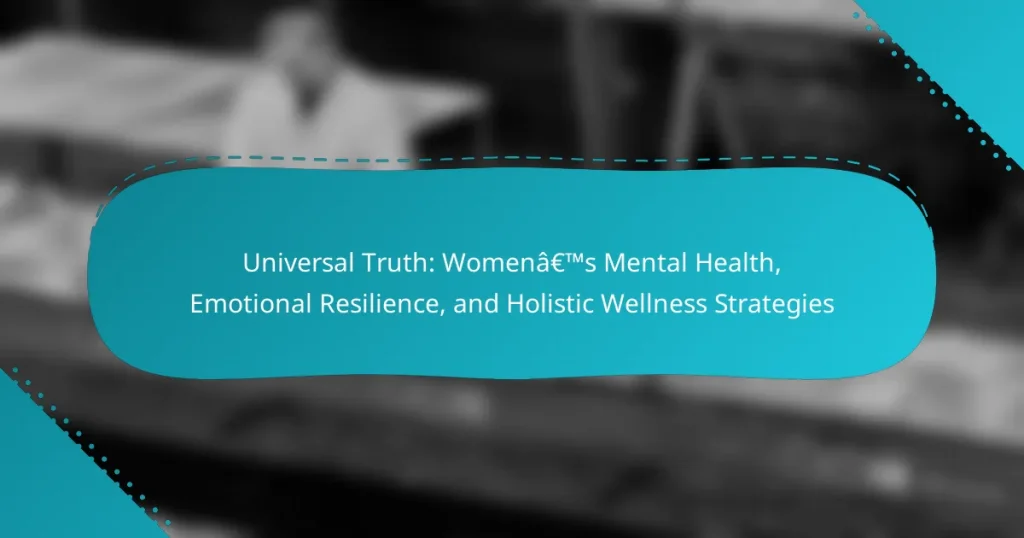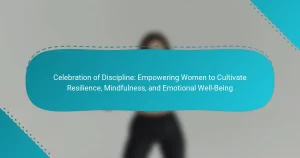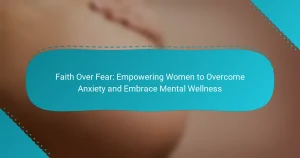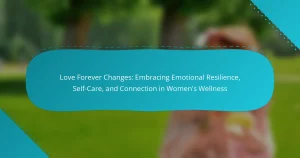Women’s mental health is crucial for developing emotional resilience and coping with unique stressors. This article explores holistic wellness strategies, including mindfulness, social support, and personalised therapy. It highlights actionable practices that enhance emotional well-being and foster community connections. Additionally, it discusses rare strategies like nature immersion and expressive arts therapy to further support mental health.
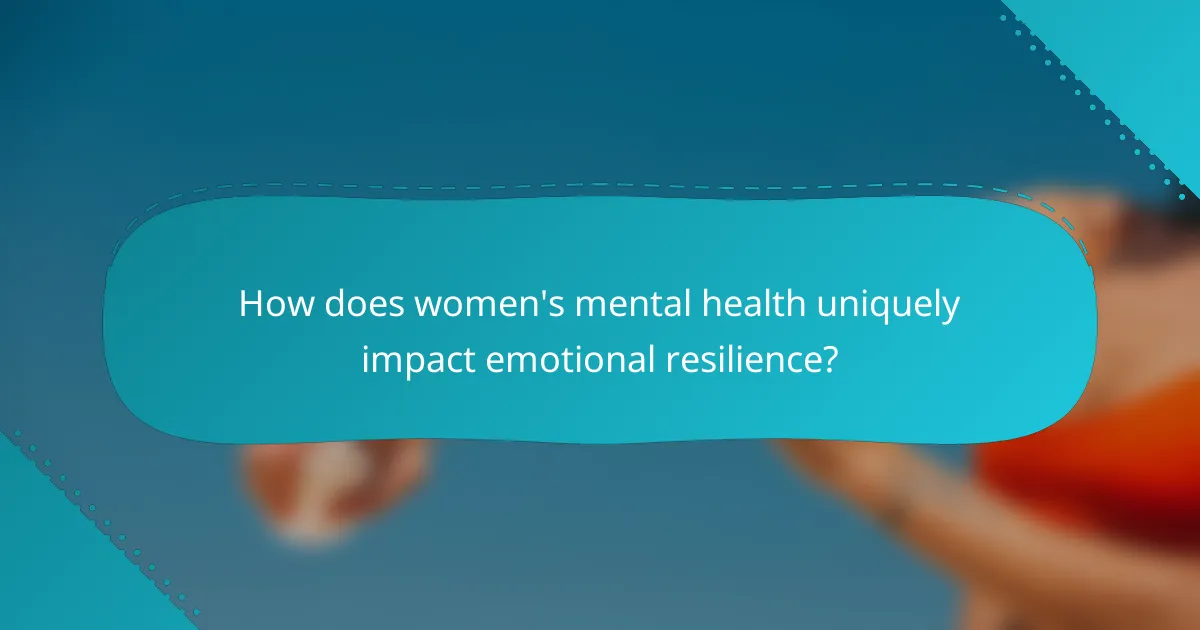
How does women’s mental health uniquely impact emotional resilience?
Women’s mental health significantly impacts emotional resilience by influencing coping mechanisms and stress responses. Women often experience unique stressors, such as societal expectations and gender-based violence, which can diminish resilience. Research indicates that women may be more prone to anxiety and depression, affecting their ability to bounce back from adversity. Holistic wellness strategies, including mindfulness and social support, can enhance emotional resilience by addressing these mental health challenges.
What are the common mental health challenges faced by women?
Women commonly face mental health challenges such as anxiety, depression, and stress-related disorders. These issues often stem from societal pressures, hormonal changes, and trauma exposure. Research indicates that women are twice as likely to experience anxiety disorders compared to men. Additionally, hormonal fluctuations during menstruation, pregnancy, and menopause can exacerbate mental health symptoms. Addressing these challenges through holistic wellness strategies, including therapy and lifestyle changes, can enhance emotional resilience.
How do societal expectations influence women’s emotional well-being?
Societal expectations significantly impact women’s emotional well-being, often leading to stress and anxiety. These pressures can manifest through unrealistic standards of beauty, career success, and familial roles. As a result, women may experience diminished self-esteem and increased feelings of inadequacy. Research indicates that societal norms can hinder emotional resilience, making it crucial to adopt holistic wellness strategies that promote mental health. Emphasising self-acceptance and community support can counteract the negative effects of these expectations, fostering a healthier emotional landscape.
What role does hormonal fluctuation play in women’s mental health?
Hormonal fluctuations significantly impact women’s mental health, influencing mood, anxiety, and emotional resilience. These changes can affect neurotransmitter levels, leading to increased vulnerability to mental health disorders. For example, premenstrual syndrome (PMS) and perimenopause highlight how hormonal shifts correlate with anxiety and depression. Understanding these fluctuations is vital for holistic wellness strategies, allowing for tailored interventions that enhance emotional well-being.
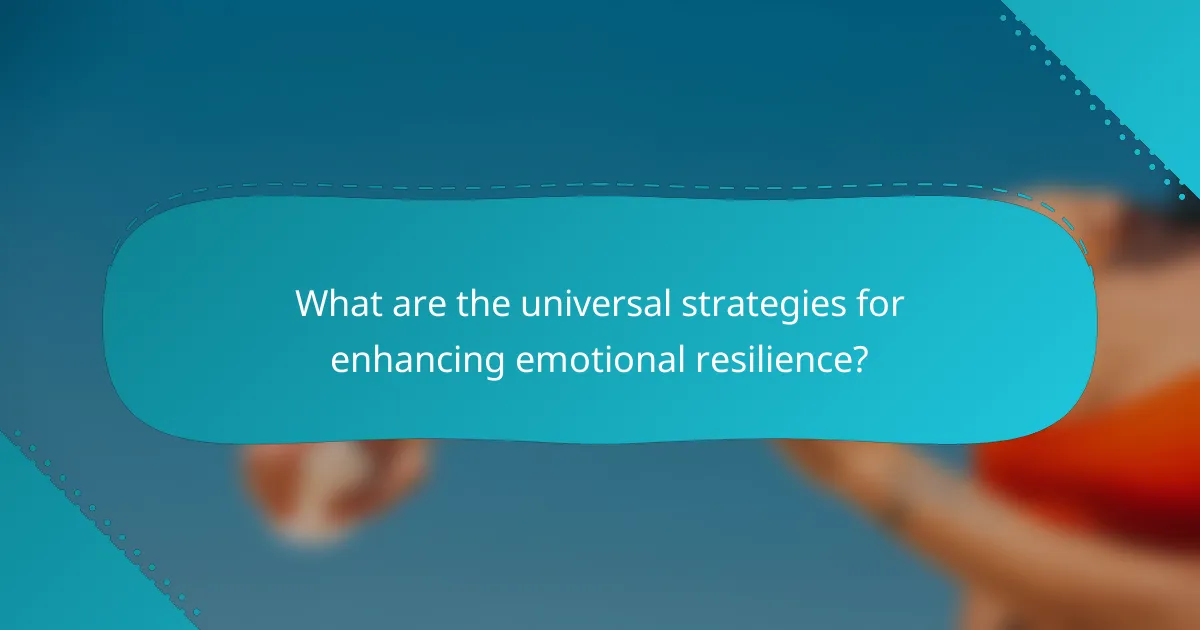
What are the universal strategies for enhancing emotional resilience?
Building emotional resilience involves adopting strategies that promote mental well-being and personal growth. Key strategies include practising mindfulness, fostering social connections, maintaining a healthy lifestyle, and developing problem-solving skills.
Mindfulness enhances self-awareness and emotional regulation, while strong social connections provide support during challenging times. A balanced diet and regular exercise contribute to overall mental health, and effective problem-solving skills empower individuals to navigate stress.
Implementing these strategies can significantly improve emotional resilience, leading to better mental health outcomes.
How can mindfulness practices support women’s mental health?
Mindfulness practices significantly enhance women’s mental health by fostering emotional resilience and promoting holistic wellness. These techniques, such as meditation and deep breathing, reduce stress and anxiety, leading to improved emotional regulation. Research indicates that women who engage in mindfulness experience lower rates of depression and enhanced self-awareness. As a result, they can better navigate life’s challenges and cultivate healthier relationships. Integrating mindfulness into daily routines empowers women to prioritise their mental well-being, ultimately supporting a balanced and fulfilling life.
What are effective mindfulness techniques for women?
Mindfulness techniques for women include meditation, deep breathing, journaling, and body scanning. These practices enhance mental health and emotional resilience.
Meditation fosters self-awareness and reduces stress, promoting a sense of calm. Deep breathing exercises activate the body’s relaxation response, helping to manage anxiety. Journaling allows for emotional expression and reflection, improving clarity and emotional processing. Body scanning encourages connection with physical sensations, fostering mindfulness of the present moment.
Incorporating these techniques into daily routines can significantly enhance overall wellness and emotional stability for women.
What physical wellness practices contribute to mental health?
Physical wellness practices such as regular exercise, balanced nutrition, and mindfulness contribute significantly to mental health. Exercise releases endorphins, improving mood and reducing anxiety. Nutrient-rich foods support brain function and emotional stability. Mindfulness techniques enhance emotional resilience by promoting stress management and self-awareness. Engaging in these practices fosters a holistic approach to women’s mental health, reinforcing emotional well-being.
How does exercise impact emotional resilience?
Exercise significantly enhances emotional resilience by reducing stress and anxiety levels. Regular physical activity promotes the release of endorphins, which improve mood and foster a sense of well-being. Studies show that women who engage in consistent exercise report higher emotional stability and better coping mechanisms during challenging situations. Additionally, exercise serves as a powerful tool for building self-confidence, which directly contributes to improved mental health outcomes.
What nutritional strategies can support mental well-being?
A balanced diet rich in nutrients can significantly enhance women’s mental well-being. Key strategies include consuming omega-3 fatty acids, antioxidants, and whole grains. Omega-3s, found in fatty fish, support brain function and mood regulation. Antioxidants from fruits and vegetables combat oxidative stress, which can affect mental health. Whole grains provide steady energy, helping to stabilise mood. Additionally, adequate hydration and regular meal timing contribute to emotional resilience. These nutritional strategies collectively foster holistic wellness for women.
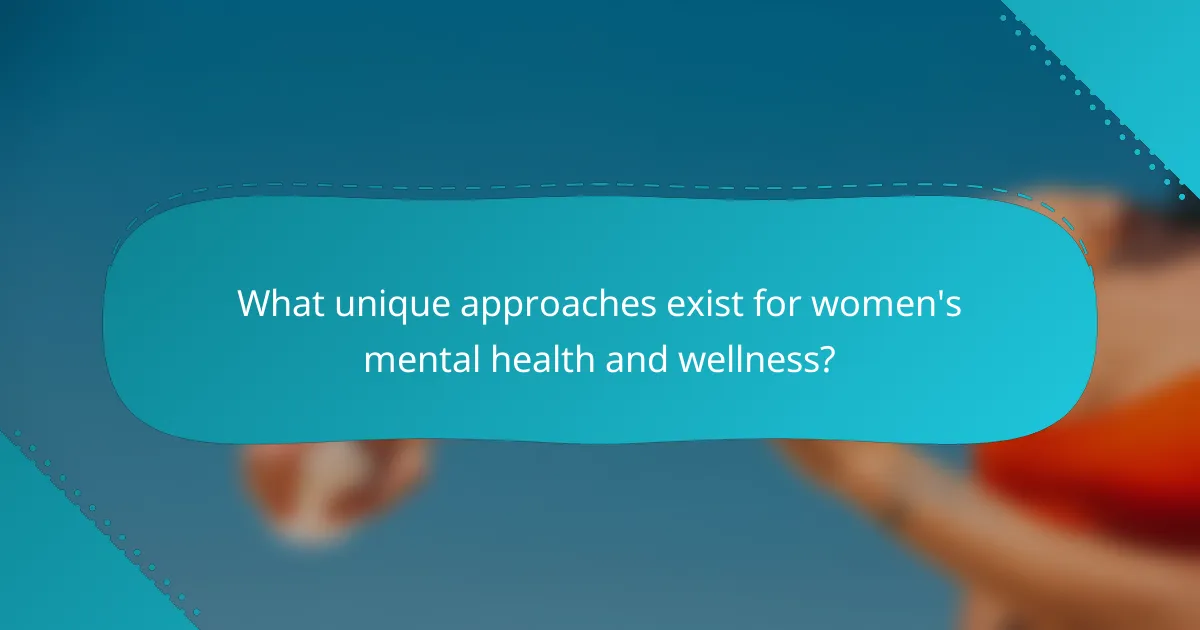
What unique approaches exist for women’s mental health and wellness?
Unique approaches for women’s mental health focus on community support, personalised therapy, and holistic practices. These strategies enhance emotional resilience and overall wellness. Community support networks provide a sense of belonging, while personalised therapy addresses individual needs, fostering deeper connections. Holistic practices, such as mindfulness and yoga, promote mental clarity and emotional balance. Integrating these approaches creates a comprehensive support system for women’s mental health.
How do community support systems enhance resilience?
Community support systems enhance resilience by fostering connections and providing resources. These systems offer emotional support, practical assistance, and shared experiences that empower women. Engaging in community activities can improve mental health and create a sense of belonging. As a result, women develop stronger coping mechanisms and increased emotional resilience. Access to local networks also facilitates holistic wellness strategies, contributing to overall well-being.
What role does therapy play in women’s mental health?
Therapy plays a crucial role in enhancing women’s mental health by providing emotional support and coping strategies. It helps address unique challenges such as societal pressures, trauma, and hormonal changes. Evidence shows that women often experience higher rates of anxiety and depression, making therapeutic interventions vital. Therapy fosters emotional resilience, enabling women to navigate stressors effectively. Additionally, holistic approaches in therapy, such as mindfulness and cognitive behavioural techniques, promote overall wellness. These methods empower women to develop healthier relationships and improve self-esteem, ultimately leading to better mental health outcomes.
What types of therapy are most effective for women?
Cognitive-behavioural therapy (CBT), dialectical behaviour therapy (DBT), and mindfulness-based therapies are highly effective for women. CBT addresses negative thought patterns, while DBT focuses on emotional regulation. Mindfulness-based therapies enhance self-awareness and stress management. These approaches promote emotional resilience and holistic wellness.
How can creative expression boost emotional resilience?
Creative expression significantly enhances emotional resilience by providing an outlet for processing feelings. Engaging in art, writing, or music allows women to articulate emotions, fostering self-awareness and coping strategies. Studies indicate that creative activities can reduce stress and anxiety, promoting mental health. For instance, expressive writing has been linked to improved emotional regulation and resilience in women facing challenges. Overall, creative expression serves as a vital tool in holistic wellness strategies, empowering women to navigate emotional difficulties effectively.
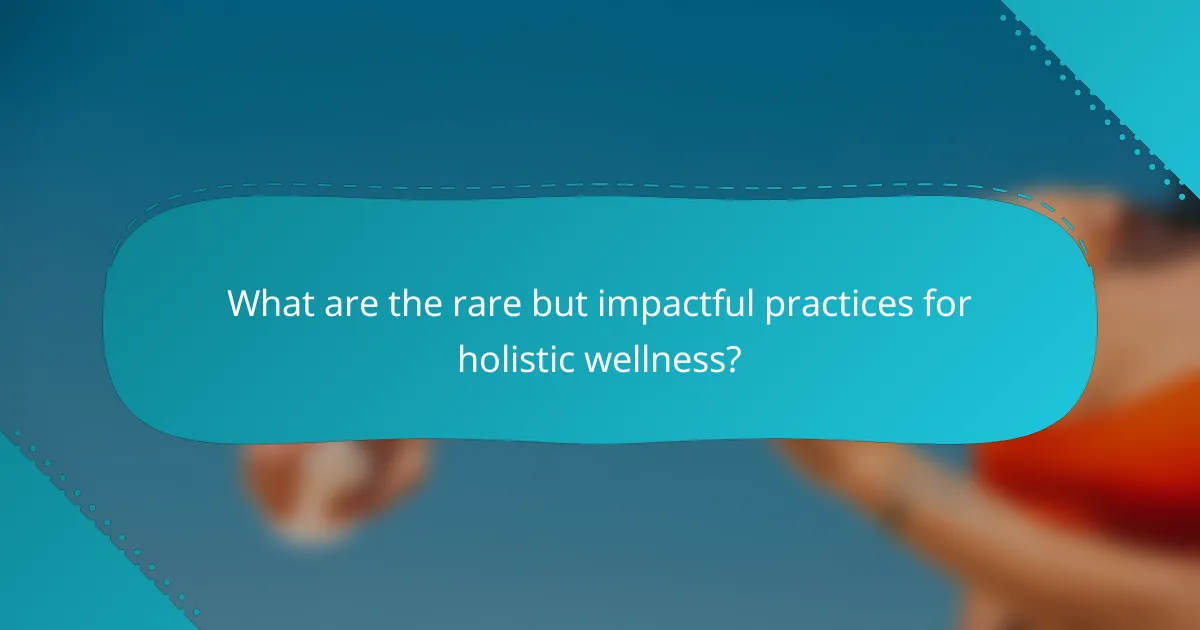
What are the rare but impactful practices for holistic wellness?
Holistic wellness practices can profoundly impact women’s mental health and emotional resilience. Rare but effective strategies include nature immersion, expressive arts therapy, and mindfulness-based stress reduction. These practices foster deep emotional connections and promote mental clarity. Engaging with nature can enhance mood and reduce anxiety. Expressive arts therapy allows emotional expression through creativity, facilitating healing. Mindfulness techniques cultivate present-moment awareness, reducing stress and improving overall well-being. Integrating these practices into daily life can significantly enhance emotional resilience.
What innovative therapies are emerging in women’s mental health?
Emerging therapies in women’s mental health include innovative approaches such as digital therapeutics, art therapy, and mindfulness-based interventions. Digital therapeutics leverage technology to provide personalised mental health support, enhancing accessibility. Art therapy allows women to express emotions creatively, fostering emotional resilience. Mindfulness-based interventions, including yoga and meditation, promote holistic wellness by reducing stress and improving mental clarity. These therapies address unique aspects of women’s mental health, emphasising emotional well-being and self-care strategies.
How does nature therapy uniquely benefit women’s mental health?
Nature therapy uniquely enhances women’s mental health by fostering emotional resilience and promoting holistic wellness. Engaging with natural environments reduces stress and anxiety, leading to improved mood and cognitive function. Research indicates that women experience greater psychological benefits from nature, such as increased feelings of connectedness and well-being. The immersive experience of nature therapy can also enhance self-esteem and provide a supportive community, crucial for women’s mental health.

What actionable tips can women implement for immediate mental wellness?
To enhance mental wellness, women can adopt actionable strategies like mindfulness, regular physical activity, and social connection. These practices promote emotional resilience and overall holistic wellness.
1. Practice mindfulness meditation daily to reduce stress.
2. Engage in at least 30 minutes of physical exercise most days.
3. Foster strong social connections through regular interactions.
4. Prioritise sleep by establishing a consistent bedtime routine.
5. Maintain a balanced diet rich in nutrients to support brain health.
6. Set aside time for hobbies to encourage creativity and relaxation.
What are the best practices for building emotional resilience daily?
Daily practices for building emotional resilience include mindfulness, self-care, and social connections. Mindfulness helps manage stress and enhances awareness of emotions. Engaging in regular self-care activities, like exercise and healthy eating, supports mental well-being. Additionally, fostering strong social connections provides emotional support and reduces feelings of isolation. These strategies collectively enhance emotional resilience and contribute to women’s mental health.
What common mistakes should women avoid in their wellness journey?
Women should avoid common mistakes that hinder their mental health and emotional resilience. Prioritising self-care, neglecting professional help, and setting unrealistic goals can derail progress. Additionally, comparing oneself to others can diminish self-worth. Cultivating a supportive community and practising mindfulness are essential strategies for holistic wellness.
How can women create a personalised wellness plan?
Women can create a personalised wellness plan by assessing their mental health, emotional resilience, and holistic wellness needs. Begin by identifying specific goals, such as stress reduction or improved self-care. Incorporate practices like mindfulness, physical activity, and nutrition tailored to individual preferences. Regularly evaluate progress and adjust the plan as necessary to foster ongoing emotional and mental well-being.
